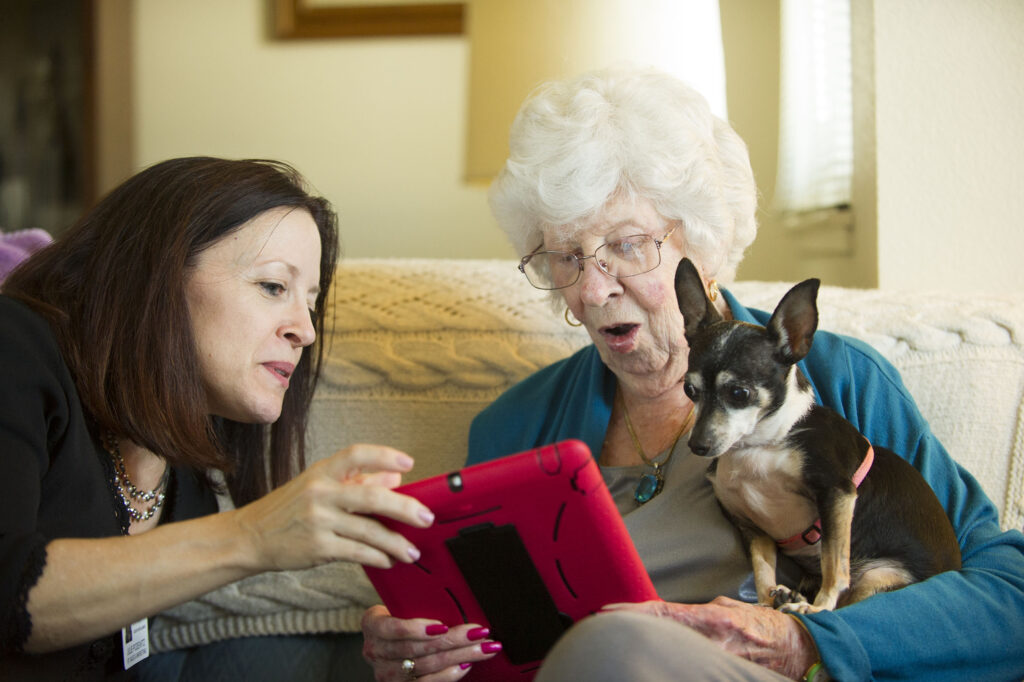They call them the sandwich generation. They’re the generation of people who find themselves in two very different caregiving roles: Raising their own children while providing care for their aging parents. And as the Baby Boomers continue to age, the largest population that the U.S. has ever seen is becoming the largest population of Senior Citizens it’s ever had.
That means the sandwich generation is growing and increasingly becoming caregivers for older Americans. According to an AARP study, 41.8 million adults were unpaid caregivers for loved ones aged 50 or older in 2020. That number is higher than 2015’s numbers by 7.6 million.
But safety in numbers doesn’t help that being a caregiver to aging loved ones is incredibly stressful. It’s common for caregivers to experience feelings of guilt, financial stress and physical and mental exhaustion that come from balancing a full-time career with caregiving duties.
Signs of Caregiver Stress
We all know that stress has a large impact on a person’s physical and mental health. This is particularly true for people experiencing the strain of caregiving responsibilities.
Estimates show between 40-70% of caregivers have clinically significant symptoms of depression, with one-quarter of those meeting diagnostic criteria for major depression. Caregiving takes a physical toll as well. About 1 in 10 caregivers report their duties have caused their physical health to get worse.
Some common signs the stress of being a caregiver is beginning to affect a person’s mental and physical well being may include:
- Feeling overwhelmed or constantly worried
- Feeling tired often
- Getting too much sleep or not enough sleep
- Weight fluctuations
- Being easily irritated or angry
- Losing interest in once enjoyable activities
- Having frequent headaches, bodily pain or other physical problems
- Increased use of alcohol or abuse of drugs
If you find yourself experiencing these or any other signs of being over-stressed, the good news is that you can do things to alleviate the burden of taking on caregiver duties.

Tips for Managing Caregiver Stress
The old saying goes an ounce of prevention is worth a pound of cure. That’s certainly the case when it comes to the stress that comes with being a caregiver. Preventing stressful situations and learning how to manage them when they occur is essential to maintaining wellbeing. Here are some tips for managing caregiver stress before it affects your health:
- Take a Break
Otherwise known as “respite,” this time should be a regular part of every caregiver’s schedule. This time allows caregivers to recharge their batteries. Taking time to step away for self-care will reduce the build-up of stress and re-energize the caregiver.
- Accept Help
It’s easy to get stuck in the mindset everything that needs to get done needs to get done by you. However, keep in mind that accepting help can help immensely. Make a list of ways others can help you when they offer to do so, whether it’s taking the person for a walk a couple of times a week or running an errand that would be an unnecessary burden to you. Remember: If you don’t have to do it alone, DON’T!
- Practice Good Sleep and Nutrition Habits
One of the biggest components of being well physically and mentally is making sure you’re taking care of your body. That means making sure you are getting adequate sleep at night so you are rested and energized to tackle your role. It also means eating well and exercising to make sure your body is in the best shape it can be in to provide care for another.
- Get Support
Seek out support groups in your community that are there to support caregivers. If you don’t have a lot of extra time to attend in-person meetings, there are online forums and resources where you can connect with others in the same position as you. If you are taking care of someone with a particular health condition such as dementia or Alzheimer’s, seek out groups for caregivers of that particular condition for support.
- Get Organized
Being a caregiver will be chaotic enough from time to time without a lack of structure making it worse. Make lists, establish routines, and break big tasks into smaller, more manageable ones. Collect emergency information, medication lists, and any other vital information about your loved one in one place that is easy to access and transport if you need to.
- Be Kind to Yourself
Whether it’s through socializing, meditation, journaling, exercise or just learning to say “no” when you need to, find ways to take care of yourself as much as you find ways to take care of others.
As a caregiver, you have taken on a huge responsibility for the selfless purpose of making sure your loved ones have their needs met. As such, make sure to put yourself first every once in a while to reduce and manage your stress, so you’re not only healthier and happier but a more effective caregiver over time.




















